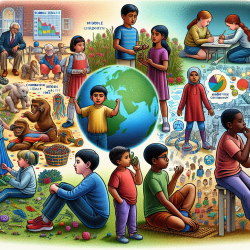The journey through emerging adulthood is a transformative period marked by significant changes in personal relationships. As practitioners, understanding these changes can enhance our ability to support individuals navigating this crucial stage of life. Recent research, "Developmental changes in best friendship quality during emerging adulthood," offers valuable insights into how friendships evolve and the factors influencing these changes.
The Importance of Best Friendships
Best friendships play a pivotal role in the social and emotional development of individuals during emerging adulthood. These relationships provide companionship, reliable alliance, and intimacy while also presenting opportunities for conflict resolution. Understanding how these elements change over time can help practitioners tailor their approaches to better support their clients.
Key Findings from the Research
- Slight Increase in Companionship and Reliable Alliance: The study found that companionship and reliable alliance tend to increase slightly in the early 20s before declining later. This suggests that young adults initially invest more in friendships before adult responsibilities begin to take precedence.
- Decline in Intimacy: Intimacy levels with best friends decrease over time, particularly from age 25 to 30. This decline may be attributed to increased commitments in romantic relationships and family life.
- Gender Differences: Women generally report higher levels of intimacy and companionship with their best friends compared to men. However, women's intimacy levels decline more significantly over time.
- Impact of Romantic Life Investment: Individuals heavily invested in romantic relationships at age 19 experience a less pronounced decline in friendship intimacy. This highlights the interplay between romantic and platonic relationships during this life stage.
Implications for Practitioners
The findings from this research offer several implications for practitioners working with emerging adults:
- Cultivate Awareness: Practitioners should be aware of the natural ebb and flow of friendship qualities during emerging adulthood. Recognizing these patterns can help normalize clients' experiences and reduce anxiety around changing social dynamics.
- Address Gender Dynamics: Understanding gender differences in friendship dynamics can inform more personalized interventions. Encouraging open communication about friendship expectations can foster healthier relationships.
- Nurture Balance: Helping clients balance their investment in romantic and platonic relationships can promote well-rounded social support networks. Encouraging discussions about relationship priorities can lead to more fulfilling connections.
The Path Forward
This research underscores the importance of continued exploration into how friendships evolve during emerging adulthood. Practitioners are encouraged to delve deeper into these findings and consider conducting further research to expand our understanding of friendship dynamics.
Developmental changes in best friendship quality during emerging adulthood










